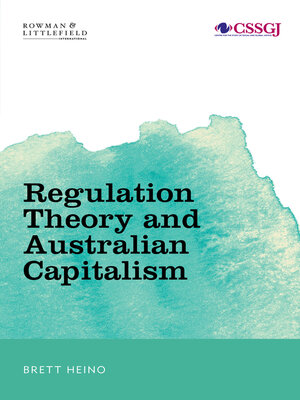Regulation Theory and Australian Capitalism
ebook ∣ Rethinking Social Justice and Labour Law · Studies in Social and Global Justice
By Brett Heino

Sign up to save your library
With an OverDrive account, you can save your favorite libraries for at-a-glance information about availability. Find out more about OverDrive accounts.
Find this title in Libby, the library reading app by OverDrive.



Search for a digital library with this title
Title found at these libraries:
| Library Name | Distance |
|---|---|
| Loading... |
The end of the post-World War II 'long boom' in the mid-1970s proved the beginning of a process of political-economic change that has fundamentally transformed labour law, both in Australia and across the developed world more generally. This is a phenomenon with deep ramifications for social justice.
The dissolution of productive industry, the fragmentation of employment categories, the rise of profound employment precarity and an increasingly hostile legal environment for trade unionism have been of immense significance for key social justice issues, including income inequality, the rise of a new working-underclass, and the marginalization of organised labour.
By combining the concepts of the Parisian Regulation Approach with an explicitly Marxist jurisprudence, this study offers a theoretically rigorous yet empirically sensitive account of legal transition, with key case studies in the metal, food processing and retail sectors. Given the similar development logic of post-World War II capitalism in Western societies, this theory, although operationalised in the Australian context, can be used in the effort to explain labour law change more broadly.
The dissolution of productive industry, the fragmentation of employment categories, the rise of profound employment precarity and an increasingly hostile legal environment for trade unionism have been of immense significance for key social justice issues, including income inequality, the rise of a new working-underclass, and the marginalization of organised labour.
By combining the concepts of the Parisian Regulation Approach with an explicitly Marxist jurisprudence, this study offers a theoretically rigorous yet empirically sensitive account of legal transition, with key case studies in the metal, food processing and retail sectors. Given the similar development logic of post-World War II capitalism in Western societies, this theory, although operationalised in the Australian context, can be used in the effort to explain labour law change more broadly.







